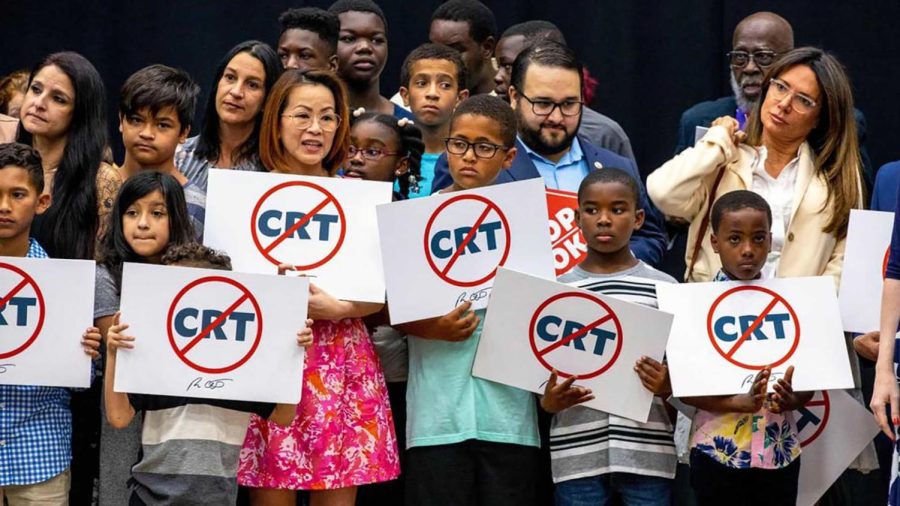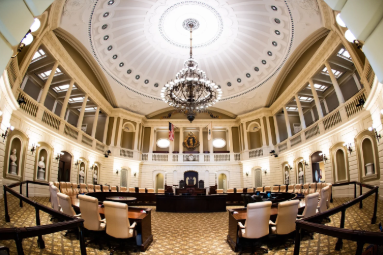Banning AP African American Studies Reveals a Double Standard Within the American School System
DeSantis uses children from minority groups in order to further push his “Anti-Woke” agenda, asserting that they would be harmed by the learning of their communities’ history within the United States. When defending his positions he uses this minority to claim that he is making the best possible decisions for the children within Florida’s school system.
March 15, 2023
Of all the issues plaguing the American school system today there is none more controversial and widely discussed than the issue of Critical Race Theory. Critical Race Theory, as defined by Oxford Languages, is “a set of ideas holding that racial bias is inherent in many parts of western society, especially in its legal and social institutions, on the basis of their having been primarily designed for and implemented by white people.” With a definition like this, and considering the widespread polarization within American politics, it’s not surprising that a definition like this, or any of the other multitudes of definitions employed by different groups, would be controversial. While laws and bills have been both proposed and passed throughout the country trying to crack down on what some consider a harmful ideology corrupting American school systems, one of the most blatant examples of this came in January when a letter from the Florida Department of Education’s office of articulation rejected a supplementary course to be offered by the College Board called AP African American Studies.
AP African American studies is a course that was first introduced in the 2022-23 school year, to be piloted at 60 schools across America. It is to expand to hundreds of additional schools in the 2023-24 school year and administer the first AP African American Studies exam in Spring 2024. During the school year following this the course will be open to all high schools across the country with an exam open to all students administered in Spring 2025. More than 200 colleges and universities committed to accepting the course for credit when it was proposed, and this number is expected to grow as time goes on. As all AP level classes are intended to be college level classes the course was made in conjunction with “faculty from hundreds of colleges and universities [in order] to ensure the course reflects the academic rigor of introductory college courses within the discipline,” according to the College Board’s official webpage for the pilot course.
With the course only in its beginning phases, many were shocked to hear that Florida would apparently ban the course from instruction. However, considering many of the policies adopted during the tenure of Florida governor Ron DeSantis, this announcement shouldn’t really be surprising. This ban comes in the wake of Desantis’s signing of a House Bill known as the S.T.O.P Woke Act which, according to a press release from the Florida Senate, “essentially prohibits instruction on race relations or diversity that imply a person’s status as either privileged or oppressed is necessarily determined by his or her race, color, national origin, or sex” as well as bans “both schools and workplaces from subjecting any student or employee to training or instruction that espouses, promotes, advances, inculcates, or compels such individuals to believe specified concepts constitutes discrimination based on race, color, sex, or national origin.” Ron DeSantis has a long history of speaking out against what he calls the “woke” or “liberal” agenda, a sentiment that seems to be applied to anything that isn’t undeniably white, cisgender, and America centric. A statement on his website declares that “This legislation is the first of its kind in the nation to take on both corporate wokeness and Critical Race Theory in schools in one act.”
Besides the obvious questions that should be raised when banning any form of cultural studies, this also highlights a damaging double standard within the American school system. A double standard that has for years gone unaddressed by educators and politicians alike. This is the fact that banning AP African American studies, which DeSantis’s press secretary Jeremy Redfern has gone on record saying lacks “historical accuracy” and “educational value,” raises questions about what then we consider to be American history (interestingly enough, DeSantis proposes dropping AP courses altogether in Florida and moving on to other advanced study options, such as the International Baccalaureate program. A statement that, as someone who is a student within the IB Diploma Programme currently, I find incredibly ironic). African Americans, whether it is acknowledged or not, are integral to the history of the United States and the historical relevance of the community’s contributions go beyond slavery and the popularly digestible and politically correct civil rights era movements.
The banning of any cultural studies is harmful and should be taken as a form of dangerous censorship that treads perilously close to a complete white-washing of history, but the fact that AP African American Studies is the only class to be banned by Florida while classes such as AP European History, AP French Language and Culture, and AP Italian Language and Culture remain intact adds insult to injury. This, paired with the statements that AP African American Studies lacks “educational value” implies that while African American history may not be worthy of study, European history is. A problematic but unsurprising sentiment.
The American school system has long struggled when it comes to teaching the history of anyone other than those of European descent, with nearly all cultural groups other than not white either completely unaddressed or inaccurately portrayed. Students are typically presented with an embellished and barebone narrative of African American history that is limited to; Black Americans were slaves, Abraham Lincoln set them free, and then years later Martin Luther King Jr. asked white people to treat people of color fairly and the powers that be simply said “Okay”, eradicating racism for all generations to come. Most students within the public school system will be lucky to hear about any Black historical figures other than the Black History Month favorites: Martin Luther King Jr., Rosa Parks, Frederick Douglas, and Ruby Bridges (and even this one is a stretch).
Expecting the problem to resolve itself is overly optimistic, and reasoning that there’s no need for specific cultural studies, such as AP African American studies is naive. Florida’s banning of AP African American studies is an unfortunate and discriminatory decision that will mar the history of this country forever, but it also brings to the forefront one of the most central problems within American education systems and gives us the chance to right the wrongs that have been done to minority groups within the American population. Finally I ask, why stop at AP African American studies? Bringing the history of Asian Americans, Indigenous Americans, and other groups to the forefront will allow us to reckon with the harm of our past and move forward as a collective.











